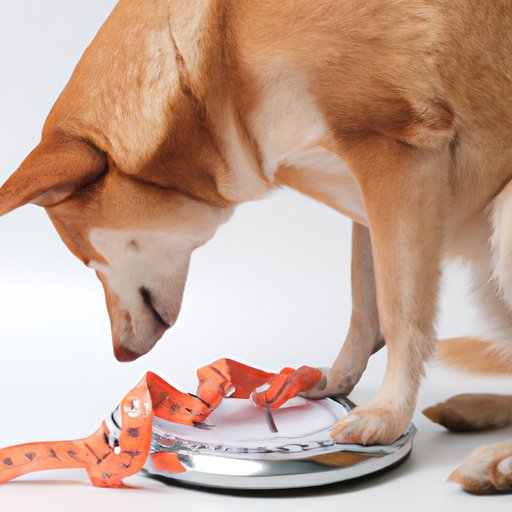
I. Introduction
As a dog owner, it can be frustrating to see your furry friend struggling to maintain a healthy weight. While some dogs may naturally be on the underweight side, others may require special attention or dietary changes to achieve a healthy weight. This article will provide an in-depth guide on how to help an underweight dog gain weight, including high-calorie foods, nutritional needs, safe weight gain practices, feeding guidelines, supplements, common mistakes, and consulting with a veterinarian.
II. High-Calorie Foods for Underweight Dogs
Feeding a balanced diet is essential for the overall health and wellbeing of dogs. However, when attempting to gain weight, it’s important to provide an additional source of calories to support healthy weight gain.
Some high-calorie foods that can be added to a dog’s diet include lean meats like chicken and turkey, carbohydrates like sweet potatoes and brown rice, and healthy fats like coconut oil and salmon oil. It’s important to note that any new foods should be introduced gradually to avoid upsetting your dog’s digestive system.
Here are some specific recipes and serving sizes that can be used to help an underweight dog gain weight:
- Chicken and Rice Bowl: Cooked chicken breast, brown rice, and a small amount of added chicken broth or olive oil to increase the calorie content. Recommended serving size is 1/2 cup for every 10 pounds of body weight.
- Beef and Sweet Potato Stew: Cooked ground beef, sweet potato, and green beans. Recommended serving size is 1/2 cup for every 10 pounds of body weight.
- Pumpkin and Peanut Butter Treats: Mix canned pureed pumpkin and smooth peanut butter to form a dough, shape into small balls, and bake in the oven. These treats can be given as a snack or used to hide supplements.
III. Understanding Your Dog’s Nutritional Needs
Before making any adjustments to your dog’s diet, it’s important to have a basic understanding of their nutritional needs. One way to determine if a dog is underweight is by calculating their Body Condition Score (BCS).
A BCS is a visual method for assessing a dog’s body composition. It ranges from 1 (emaciated) to 9 (extremely obese), with a score of 4-5 indicating a healthy weight. If your dog’s BCS falls below this range, it’s time to take action to help them gain weight.
Some of the essential nutrients that dogs need for optimal health include protein, carbohydrates, fats, vitamins, and minerals. Commercial dog foods should provide these nutrients, but it’s important to choose a high-quality diet that’s appropriate for your dog’s life stage, size, and activity level.
IV. How to Help Your Dog Gain Weight Safely
When attempting to help an underweight dog gain weight, it’s important to take a gradual approach to avoid any digestive upset or shock to their system. Gradual increases in caloric intake can help prevent diarrhea, vomiting, or loss of appetite.
One way to increase your dog’s caloric intake is by feedings smaller, more frequent meals throughout the day. This can help stimulate their appetite and encourage healthy weight gain.
When introducing new foods, it’s important to do so gradually and monitor your dog’s response. Any signs of digestive upset should prompt you to reduce or eliminate that ingredient from their diet.
V. Feeding Guidelines for Underweight Dogs
When it comes to feeding an underweight dog, there are some general guidelines that can be followed to encourage healthy weight gain.
Smaller, more frequent meals (3-4 times a day) can help stimulate appetite and support healthy weight gain. Using food puzzles or interactive toys can also make mealtime more engaging and encourage your dog to eat.
Specific feeding recommendations can vary based on your dog’s weight, age, and activity level. Consult with your veterinarian for a personalized feeding plan.
VI. The Role of Supplements in Dog Weight Gain
Supplements can be a helpful tool in supporting dog weight gain. Some popular supplements include probiotics, omega-3 fatty acids, and digestive enzymes.
Probiotics can help improve digestion and nutrient absorption, while omega-3 fatty acids can help reduce inflammation and promote healthy skin and coat. Digestive enzymes can help break down food and improve nutrient absorption.
It’s important to consult with your veterinarian before adding any new supplements to your dog’s diet, as incorrect dosage or inappropriate use can lead to adverse side effects.
VII. Common Mistakes When Feeding an Underweight Dog
When attempting to help an underweight dog gain weight, it’s important to avoid some common mistakes that could impede progress. One common mistake is feeding too much too soon, which can lead to digestive upset or even obesity.
Another mistake is relying too heavily on treats or table scraps. While these foods may be high in calories, they lack the essential nutrients that dogs need for overall health and wellbeing.
Instead, focus on providing balanced, nutrient-dense meals throughout the day.
VIII. Consult with Your Vet
Consulting with your veterinarian is a crucial step in helping an underweight dog gain weight. Your vet can help diagnose any underlying health issues that could be contributing to weight loss, provide tailored nutritional recommendations, and monitor your dog’s progress.
IX. Conclusion
Gaining weight can be a slow and gradual process for underweight dogs, but it’s important for their overall health and wellbeing. By providing a balanced, high-calorie diet, using supplements when appropriate, and consulting with your vet, you can help your furry friend achieve a healthy weight and optimal health.
Remember to take a gradual approach, be patient, and monitor your dog’s progress along the way.




